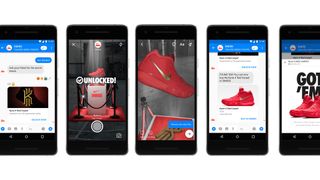Facebook Messenger wants you to engage with businesses using augmented reality
New AR features launching in a closed beta for now

Augmented reality (AR) is helpful for letting customers see what they're purchasing before hitting the 'buy' button, and now Facebook is rolling out this useful feature to the Messenger app. Kind of.
Launching in a closed beta, AR is coming to Messenger for businesses that use bots, or automated messaging systems to communicate with customers.
By utilizing Facebook's Camera Effects Platform, businesses can add brand-specific effects that their customers can engage with. All customers have to do is open the camera on their phone, and filters and AR effects pop up.
The limited launch sees partners Nike, Kia, Asus and Sephora offering users a way to, for example, see a Kia Stinger in different colors, or what certain makeups look like on their face.
There are no OS or hardware requirements for AR to work on Messenger, though again, this is a closed beta limited to certain partners for now.

Users can then turn around and share the experiences with others in a group chat or one-on-one message, or in a Facebook Story.
The idea is that friends and family can give feedback on the product, mirroring the shopping in-store experience one might have with someone whose opinion they value.
Get daily insight, inspiration and deals in your inbox
Sign up for breaking news, reviews, opinion, top tech deals, and more.
According to Facebook, there are over 300,000 active bots on Messenger, and 8 billion messages are shared between people and businesses every month.
It remains to be seen whether the new AR effects provide real value to customers or are merely a novelty, but it's clear Facebook is actively developing its AR features. Apple's ARKit and Google ARCore better watch out.
- These are the best iPhone VR apps and games
Michelle was previously a news editor at TechRadar, leading consumer tech news and reviews. Michelle is now a Content Strategist at Facebook. A versatile, highly effective content writer and skilled editor with a keen eye for detail, Michelle is a collaborative problem solver and covered everything from smartwatches and microprocessors to VR and self-driving cars.
Most Popular

